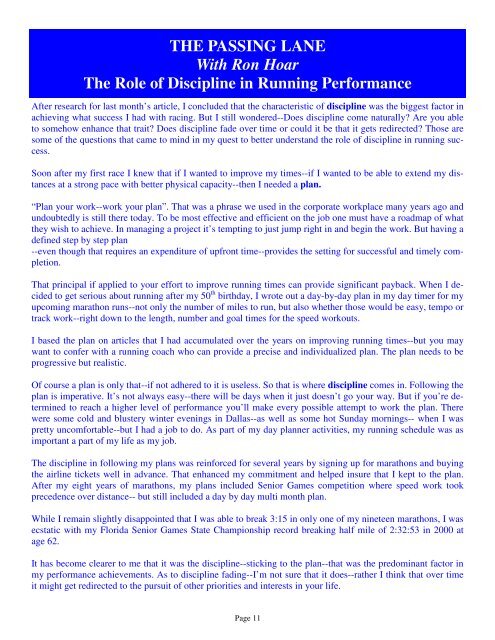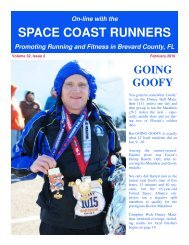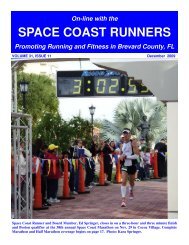May - Space Coast Runners
May - Space Coast Runners
May - Space Coast Runners
- No tags were found...
You also want an ePaper? Increase the reach of your titles
YUMPU automatically turns print PDFs into web optimized ePapers that Google loves.
THE PASSING LANEWith Ron HoarThe Role of Discipline in Running PerformanceAfter research for last month’s article, I concluded that the characteristic of discipline was the biggest factor inachieving what success I had with racing. But I still wondered--Does discipline come naturally? Are you ableto somehow enhance that trait? Does discipline fade over time or could it be that it gets redirected? Those aresome of the questions that came to mind in my quest to better understand the role of discipline in running success.Soon after my first race I knew that if I wanted to improve my times--if I wanted to be able to extend my distancesat a strong pace with better physical capacity--then I needed a plan.“Plan your work--work your plan”. That was a phrase we used in the corporate workplace many years ago andundoubtedly is still there today. To be most effective and efficient on the job one must have a roadmap of whatthey wish to achieve. In managing a project it’s tempting to just jump right in and begin the work. But having adefined step by step plan--even though that requires an expenditure of upfront time--provides the setting for successful and timely completion.That principal if applied to your effort to improve running times can provide significant payback. When I decidedto get serious about running after my 50 th birthday, I wrote out a day-by-day plan in my day timer for myupcoming marathon runs--not only the number of miles to run, but also whether those would be easy, tempo ortrack work--right down to the length, number and goal times for the speed workouts.I based the plan on articles that I had accumulated over the years on improving running times--but you maywant to confer with a running coach who can provide a precise and individualized plan. The plan needs to beprogressive but realistic.Of course a plan is only that--if not adhered to it is useless. So that is where discipline comes in. Following theplan is imperative. It’s not always easy--there will be days when it just doesn’t go your way. But if you’re determinedto reach a higher level of performance you’ll make every possible attempt to work the plan. Therewere some cold and blustery winter evenings in Dallas--as well as some hot Sunday mornings-- when I waspretty uncomfortable--but I had a job to do. As part of my day planner activities, my running schedule was asimportant a part of my life as my job.The discipline in following my plans was reinforced for several years by signing up for marathons and buyingthe airline tickets well in advance. That enhanced my commitment and helped insure that I kept to the plan.After my eight years of marathons, my plans included Senior Games competition where speed work tookprecedence over distance-- but still included a day by day multi month plan.While I remain slightly disappointed that I was able to break 3:15 in only one of my nineteen marathons, I wasecstatic with my Florida Senior Games State Championship record breaking half mile of 2:32:53 in 2000 atage 62.It has become clearer to me that it was the discipline--sticking to the plan--that was the predominant factor inmy performance achievements. As to discipline fading--I’m not sure that it does--rather I think that over timeit might get redirected to the pursuit of other priorities and interests in your life.Page 11
















